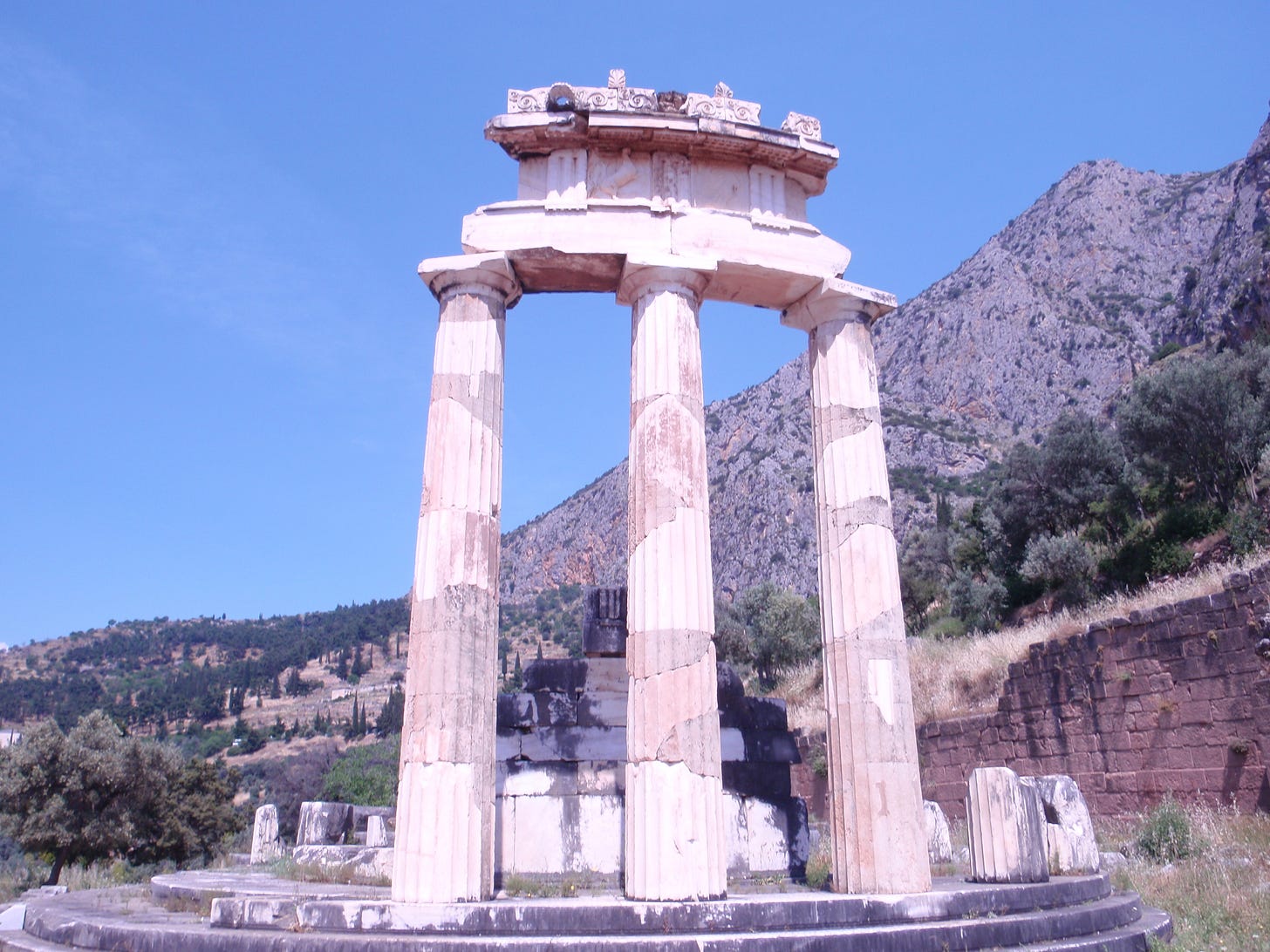Metacognition
Power of Multiple Perspectives
To know that one does not know is best; Not to know but to believe that one knows is a disease. Lao Tzu
The Oracle at Delphi
Delphi, the remote mountain sanctuary of Apollo, is the most scenic of all classical sites in Greece. It lies in a natural amphitheatre with views that sweep a hundred miles across valleys that recede to the sea. The sense of timelessness struck me, and I felt as if I was waiting in line with other ancient pilgrims to consult the famous Delphic Oracle.
The Delphic Oracle was a priestess who went into a trance and 'divined' or prophesied what the gods had to say. Geologists discovered in 2001 that ethylene gas seeping between the rocks caused the visions that the Oracle was supposed to have seen. It was a bit of a comedown, I admit, as the guide painstakingly pulled the veil over what I thought was a fascinating mystery.
At its zenith in the 5th century BCE, access to the Oracle was restricted to just one day a month, and there was no access during the three months of winter- a clever tactic, no doubt, to increase the value of the prophecy.
The ancients used the Oracle to 'see beyond' and take the help of the gods to be more prescient about the future.
The first of the three important maxims inscribed in the pronaos (forecourt) of the Temple of Apollo at Delphi) is “Know thyself”.
As mortals, these maxims guide us, and unlike the ancients, we don't need the gods anymore.
Science has helped us become aware of our unique capacity for self-awareness. It's called metacognition-literally, the ability to think about our thinking-from the Greek "meta" meaning "after" or "beyond."
The amphitheatre is rolling into the valley.
Science of Self-Awareness
Our success and failure hinge on our power of metacognition.
Stephen Fleming's work on cognitive and biological processes of self-awareness has dramatically increased our understanding of the science of self-awareness.
We also have more clarity on two critical questions associated with metacognition.
What's the brain's most important job?
And how does our brain ensure we are self-aware?
Our brain's most important job isn't to think, it's running the systems of our body to keep us alive and well'- to balance our 'body budget', a process known as allostasis. Much of our brain's monitoring activity happens outside our awareness, which means we will never know what's happening 'under the hood.
Our brain ensures we are self-aware by developing specific algorithms to track uncertainty.
Why is computing uncertainty a fundamental function of the brain?
It's because our brain sits isolated in the dark chamber of the skull, solving the problem of what's out there by combining the data from our different senses to create our reality, secondhand. Using mechanisms that are still not fully understood, 'the brain has to assess the reliability of the data while continuously updating the model in our minds of what's out there.
Pilot and Autopilot.
Implicit metacognition refers to all the activity under the 'hood' that our brain predicts and monitors. It takes actions to keep us stable and functioning, which often proceeds automatically and unconsciously.
Explicit metacognition refers to aspects of metacognition that we are consciously aware of, our feelings of doubt, and our lack of confidence in some complex situations.
These feelings signal that we are aware that something is not correct, and we develop the ability to doubt what our senses tell us and monitor our actions.
It's like we are the pilot, and our brain runs our body on 'autopilot'- self-monitoring all the activities that we need not know. As the pilot, we are watchful and alert to how the aircraft is flying, but we are not aware of all the continual adjustments our brain makes to keep our mental planes flying straight and level at 30,000 ft. We intervene only when necessary.
When Miracle on the Hudson-Sully landed his aircraft on Hudson River, he had only 35 seconds to ditch the autopilot, take over and consciously make the decision that saved the lives of all on board-the power of metacognition.
Multiple Perspectives
"Of course, I care about how you imagined I thought you perceived I wanted you to feel."Caption in a New Yorker Cartoon.
Why do capable leaders people find it difficult to change?
We become receptive to new information that might contradict our existing views by being open to change. The dilemma is that we want to be open when changing our minds when we are likely wrong and remain steadfast when we are right.
When explicit metacognition is accurate, it's easier to avoid being caught in this circle of indecision and stuck with decisions or beliefs that we should have reversed or discarded long ago.
Our feelings of doubt or lack of confidence signal us to step back and re-examine our point of view and seek multiple perspectives.
How Meera learned to 'Have Fun'.
Meera was an introvert and technically brilliant- on a leadership fast track in a large consulting firm, who wanted her to be more 'visible'. While she tried to build her brand and meet people, she struggled with a solid aversion to wasting time. She found most meetings a waste of time as people were unclear about why they wanted to meet and felt inadequate when she didn't have anything to contribute meaningfully in these 'unplanned' meetings.
This feeling of inadequacy further reinforced her belief that she should stick to her technical work.
As we spoke, she realised that the real reason for her aversion to meeting people was her fear of losing control. She was so much in command in technical conversations that she led and in so little control in people conversations of which she was only a part.
I asked her if there could be other reasons why meeting people was essential and not quantifiable or measurable. She laughed and agreed that having fun was a good reason to meet people and attend impromptu gatherings and social occasions.
Realising that 'Having Fun' was an acceptable reason for anything allowed her to develop a new perspective. It has become her motto in life. She is more 'chilled', easy going and more 'fun.'
There is a difference between our capacity for metacognition and the accuracy of the self-awareness that results. We all have a capacity for metacognition. We wake up in the morning and start thinking about ourselves.
On the other hand, our accuracy of metacognition differs and becoming more aware requires help from others who are not immersed in your world and see things that you may miss. It also means a better appreciation of multiple perspectives and recognising the importance of 'honouring differences'.





